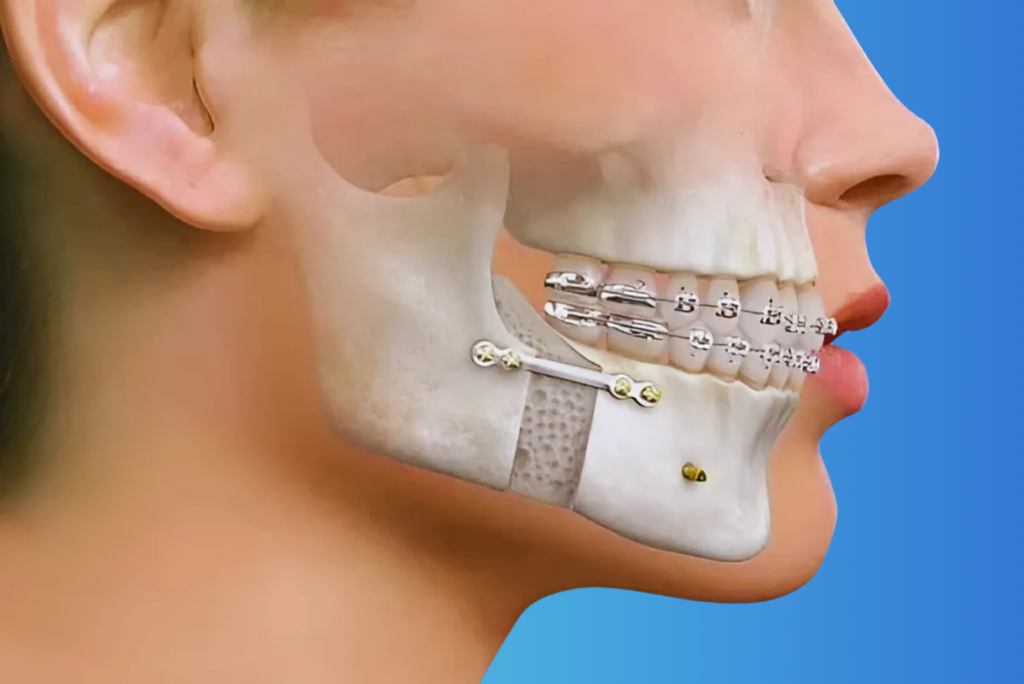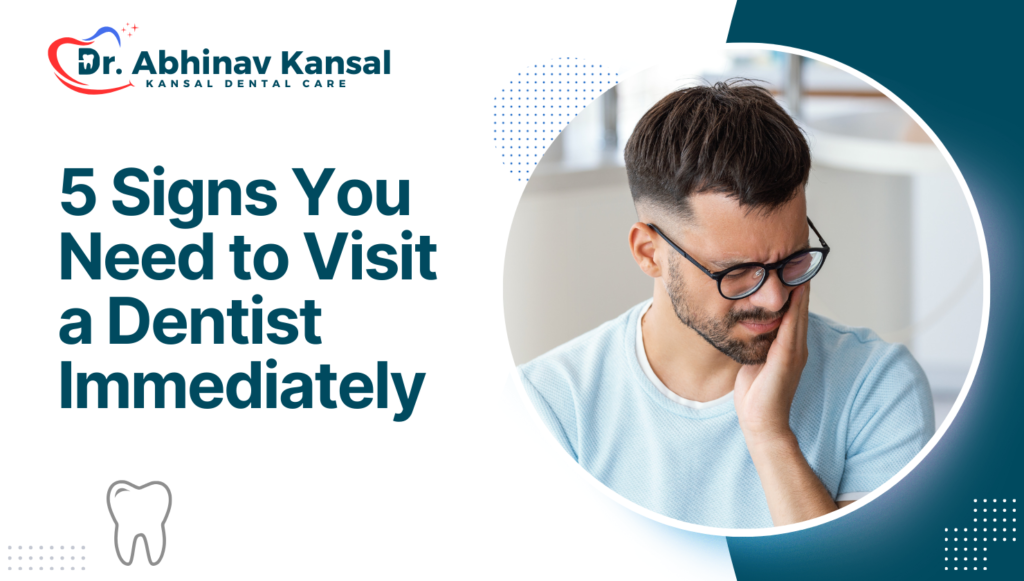Broken Jaw: Causes, Symptoms, and Treatments फ्रैक्चर्ड जबड़ा: कारण, लक्षण और उपचार

Related Articles Braces: Your Path to a Perfect Smile (दांतों में तार लगवाना) Broken Jaw: Causes, Symptoms, and Treatments फ्रैक्चर्ड जबड़ा: कारण, लक्षण और उपचार The Benefits of Fluoride for Dental Health Jaw Fracture: Causes, Symptoms, and Treatments फ्रैक्चर्ड जबड़ा: कारण, लक्षण और उपचार Written by Dr. Abhinav Kansal, BDS, MDS (Endodontist) Founder and Chief Dental Specialist at Kansal Dental Care, Meerut What is Jaw Fracture? A jaw fracture, or broken jaw, is a serious injury that can affect your ability to eat, speak, and even breathe. It occurs when the lower jawbone (mandible) or upper jawbone (maxilla) is impacted with enough force to break, and it’s considered a medical emergency regardless of the fracture’s location. Jaw fractures are the second most common facial fractures, with only nasal fractures occurring more frequently. They often result from physical trauma, such as vehicle accidents, sports injuries, or interpersonal violence. This guide explores the symptoms, treatment, and recovery process for jaw fractures, as well as ways to minimize risk and ensure a smooth recovery. What Causes a Jaw Fracture? Most jaw fractures result from: Physical Trauma: Being hit in the jaw, often during fights or accidents. Vehicle Accidents: Motor vehicle accidents are a leading cause of jaw fractures. Sports Injuries: Contact sports and high-risk activities, like skiing or biking without protective gear, increase the chance of facial fractures. Workplace Accidents: Certain jobs may expose workers to a higher risk of facial injuries. Protective measures, such as wearing helmets and mouthguards, significantly reduce the risk of a jaw fracture in these scenarios. Symptoms of a Broken Jaw If you suspect you have a jaw fracture, look out for these common symptoms: Intense Pain: Especially when trying to move your jaw. Swelling and Bruising: Notably on the jawline, cheek, or around the mouth. Misalignment of Teeth: Your bite may feel “off,” or teeth might not meet correctly. Difficulty Breathing or Swallowing: Due to swelling and restricted movement. Numbness or Tingling: Particularly around the lower lip or jawline. Difficulty Opening or Closing the Mouth: Making it hard to eat, speak, or yawn. Diagnosing a Jaw Fracture Diagnosis of a jaw fracture involves a physical examination by a healthcare provider, often followed by imaging tests such as: X-rays: To assess the fracture location and severity. CT Scans: To detect any additional fractures or internal injuries. Prompt medical attention is essential for proper treatment and to prevent complications. Treatment Options for Jaw Fractures The severity of the fracture determines the treatment approach: Minor Fractures: For less severe cases, healthcare providers may recommend a liquid or soft-food diet for a few weeks to allow the bone to heal naturally. Surgical Intervention: More severe fractures require surgery, where metal plates or screws are inserted to stabilize the bone. In some cases, the jaw may be wired shut for several weeks to promote healing. Common Post-Surgery Care Tips: Use ice packs to minimize swelling. Follow a liquid or soft-food diet to avoid placing stress on the jaw. Practice proper dental hygiene with a prescribed mouth rinse since brushing may be restricted. Complications of a Broken Jaw Without treatment, jaw fractures can result in significant complications: Malocclusion: Improper alignment of teeth, leading to issues with bite and chewing. Infection: Post-surgical infections are possible if the area isn’t properly cared for. Hardware Failure: Plates or screws may become dislodged, requiring additional procedures. Long-term Impact on Appearance: Untreated fractures may alter facial symmetry, impacting appearance and potentially self-esteem. Recovery Process Jaw fractures take weeks or even months to heal completely. Full recovery typically includes: Physical Therapy: To regain normal jaw function. Dietary Adjustments: Sticking to soft foods or liquids to avoid stressing the jaw. Regular Check-ups: Ensuring that the jaw is healing as expected and that any surgical hardware is intact. For individuals with wired jaws, it’s advised to carry a wire cutter in case of emergencies, such as the need to vomit, to prevent choking. Preventing Jaw Fractures While accidents aren’t always avoidable, the following steps can help reduce your risk: Wear Helmets and Mouthguards: Essential for activities like biking, contact sports, and certain workplace environments. Use Seatbelts: Proper use of seatbelts in vehicles can prevent or reduce facial injuries. Employ Safety Measures in Hazardous Work: Certain jobs may require specialized headgear to reduce risk. When to Seek Medical Help If you experience persistent pain, difficulty breathing, or signs of infection (fever, swelling, etc.), consult a healthcare provider immediately. Living with a Jaw Fracture: Adjusting to Recovery Recovering from a jaw fracture often requires lifestyle adjustments. A liquid or soft-food diet is often necessary, and dental hygiene may require alternatives like antiseptic mouth rinses. Discuss your recovery with a healthcare provider to ensure your diet remains nutritious and balanced. If you’re experiencing complications or unusual symptoms, prompt communication with your provider is essential. With the right care and precautions, most people make a full recovery, eventually resuming their normal activities. Make your inbox smile! Tags: Broken Jaw Symptoms, Jaw Fracture Treatment, Dental Emergencies, Fractured Jaw Healing Process, Jaw Pain Relief, Causes of Jaw Fracture, How to Treat a Broken Jaw, Jaw Injury Recovery Tips, Oral Health After Jaw Surgery, Jaw Fracture Diagnosis and Tests
5 Signs You Need to Visit a Dentist in Meerut Immediately

Emergency Dental Care 5 Signs You Need to Visit a Dentist in Meerut Immediately Abhinav Kansal September 25, 2024 Dr. Abhinav Kansal We understand just how closely connected oral health is to your overall health. Open Profile Share: Oral health is something we often take for granted until it becomes a problem. Ignoring early signs of dental issues can lead to serious complications that might require immediate attention. Knowing when to visit a dentist could save you from pain, costly procedures, and long-term damage. As one of the best dentists in Meerut, Kansal Dental Care is here to help you identify when it’s time to seek professional dental care. 1. Persistent Toothache A toothache that lasts more than a day or two is a red flag. While occasional sensitivity can happen, persistent pain could indicate underlying problems such as decay, infection, or an abscess. If over-the-counter painkillers aren’t helping, it’s time to see a dentist. At Kansal Dental Care, we prioritize emergency cases and offer immediate care to relieve your pain and address the root cause. Don’t ignore a toothache; it may lead to more serious issues like tooth loss or infection. 2. Swollen Gums or Bleeding Swollen, tender, or bleeding gums, especially during brushing or flossing, could be a sign of gum disease (gingivitis or periodontitis). While some gum sensitivity can occur due to hard brushing, consistent bleeding is not normal and should be addressed quickly. Our experienced team at Kansal Dental Care specializes in diagnosing and treating gum disease before it escalates. If you’ve noticed these symptoms, schedule an appointment right away for a thorough evaluation and professional cleaning. 3. Loose Teeth or Sudden Tooth Movement Adult teeth should not feel loose. If you experience sudden tooth movement, shifting, or a wobbly tooth, it may indicate bone loss, advanced gum disease, or trauma. Early treatment can prevent the tooth from falling out and protect the surrounding teeth. We offer advanced dental procedures, including treatments for gum disease and tooth replacement options like dental implants, to address this issue. 4. Mouth Sores That Won’t Heal Sores, ulcers, or lesions in the mouth that persist for more than two weeks could be a sign of infection or, in rare cases, oral cancer. It’s essential to get any abnormal sore checked by a dentist immediately. At Kansal Dental Care, we provide thorough oral cancer screenings and other diagnostic services to ensure any issues are caught early. 5. Chronic Bad Breath If you notice persistent bad breath (halitosis) despite maintaining a good oral hygiene routine, it could be a sign of an underlying issue like gum disease, cavities, or even an infection. Chronic bad breath is often a sign that bacteria are present in the mouth, which can lead to more serious dental conditions if left untreated. Our Meerut-based clinic offers comprehensive cleaning services to remove plaque and bacteria, preventing bad breath and improving overall oral health. When to Visit an Emergency Dentist If any of these symptoms sound familiar, it’s crucial to visit your dentist sooner rather than later. Many people delay dental visits because they hope the problem will go away on its own, but this can lead to more severe issues that are costlier to treat. At Kansal Dental Care, our team is skilled in providing emergency dental services. Whether it’s a toothache, a loose tooth, or an injury, we’re here to give you the treatment you need as quickly as possible. Why Kansal Dental Care Is the Best Choice for Urgent Dental Care in Meerut With over 12 years of experience, Dr. Abhinav Kansal and his team provide high-quality, compassionate dental care for the entire family. We’re equipped with the latest technology and offer a range of services, from routine check-ups to emergency dental care. If you’re looking for the best dentist in Meerut for your urgent dental needs, Kansal Dental Care is ready to help. Whether you’re experiencing any of the signs mentioned above or simply need a check-up, we encourage you to visit us. Book your appointment online at drabhinavkansal.com or call us directly to schedule your visit. Tags: best dentist in Meerut, dental care Meerut, emergency dentist, signs of dental issues, oral health tips, toothache remedies, gum disease symptoms, urgent dental care, pediatric dentist Meerut, dental implants Meerut, family dentistry Meerut, mouth sores treatment, bad breath solutions, tooth decay prevention Share: Book a Consultation It’s easy and free!
